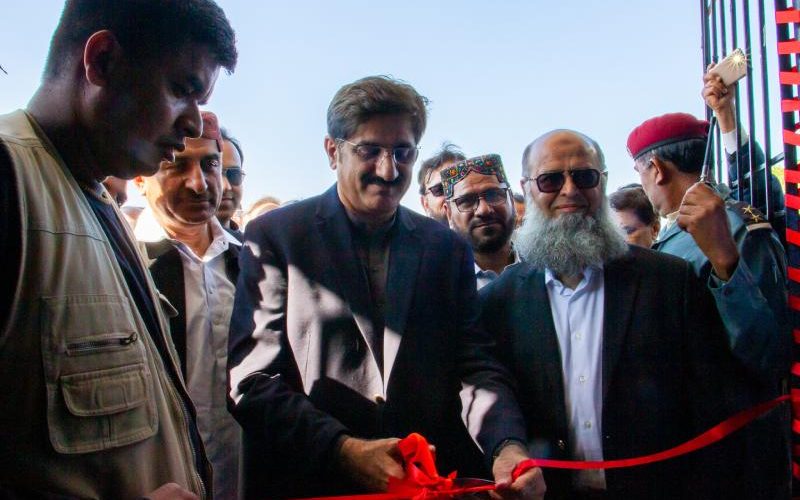INAUGURATION OF REHABILITATION CENTER BY THE HONORABLE CHIEF MINISTER SINDH SYED MURAD ALI SHAH AT THE DHQ BADIN MANAGED BY THE INDUS HOSPITAL
The Honorable Chief Minister Sindh Syed Murad Ali Shah inaugurated the newly established Physical Rehabilitation Center (PRC) at the DHQ Badin on Monday the 13th of January 2020. It is the first of its kind in Interior Sindh and the fourth one established by the Indus Hospital at the various Hospitals manage by it in Sindh and Punjab with the support of ICRC and Chal Foundation. The PRCs provide Prosthetic & Orthotic devices (Artificial Limbs), Physiotherapy services and mobility aids to the physically disabled who constitute the most neglected and deprived part of the society. It is worth to note that the Indus Hospital is already running 03 such centers each at the Indus Hospital Karachi, Lahore and Muzaffargarh since 2015 in which more than 16,500 patients have been registered out of which 9500 patients have already been provided more than 11500 devices. The devices included 6000 prosthetic and 5500 Orthotic devices.
Objectives:
The purpose of the Prosthetic & Orthotic devices is to provide mobility and restore the function and/or cosmetics of the residual part of patient’s body, affected by loss of function, deformity or amputation enabling them to become independent and contributive citizens than being dependent on others. Thus children with amputation or affected by polio can go back to their schools, adults can go back to their jobs and women serve their families back at home.
Besides this Physiotherapy services (Both Outpatient and Inpatient) are provided to the patients at the PRCs. This includes Physiotherapy for Neurologically impaired individuals, including exercises and gait training, Patients with Orthopedic conditions requiring Musculoskeletal Physiotherapy and exercises, patients with Stroke, and in patients with Cardiac and Respiratory problems. In addition, Obstetrical patients are provided Physiotherapy services both in antenatal and Post-natal periods. All services are provided to both Pediatric and Adult population.
The objective of The Indus Hospital Rehabilitation Directorate is to improve access of the physically disabled to quality rehabilitation services throughout Pakistan. Physically disabled being the most under-privileged segment of the society, need urgent attention, as it has remained the most neglected area in terms of priority in the health sector.
Need Assessment:
As per WHO estimates 0.5 % of a general population is physically disabled requiring some kind of rehabilitation and assistive devices. This ratio may be much higher in developing countries where health services are poor and population is affected by diseases, conflicts and road side accidents. Even if we follow these WHO estimates, in Pakistan 11,00,000 physically disables are in urgent need of Physical Rehabilitation.
The existing rehabilitation centers (both in public & private sector) in Pakistan may hardly be able to cater for less than 10% of those in need of such services. Therefore there is a need to establish more rehab centers at the divisional and district level throughout Pakistan.
Background:
Looking into the urgent need for the rehabilitation of the physically disabled in Pakistan The Indus Hospital took the initiative, and with the help of its partners (ICRC & CHAL Foundation Islamabad) and the Government to establish PRCs.
The land and utilities, were provided by the TIH/government hospitals, whereas the building/ infrastructure, machinery, tools and materials were provided and funded by the ICRC through CHAL Foundation Islamabad, being the implementing partner.
All the four rehabilitation centers are currently being managed by The Indus Hospital Rehabilitation Directorate whereas the materials and components for the devices are still being provided by the ICRC.
Establishment of PRC at TIH Badin Campus:
The idea of establishing a state of the art Physical Rehabilitation Center at the DHQ Badin was initiated in March 2018 in a meeting held between the TIH and the ICRC at Islamabad. The main reason was the lack of such services for the physically disabled throughout Interior Sindh. A five (05) years MoU was signed in 2018 in which the ICRC agreed to partially fund the construction of the center while the rest was contributed by The Indus Hospital from its own resources. Besides this the ICRC agreed to provide the required the Machinery and equipment and materials while the Indus Hospital provided the furnishing of the PRC.
The construction work started in March 2019 and the center became functional in September 2019 starting the provision of rehabilitation services. So far a total of 68 patient have been registered, out of which 54 patients have already been provided prosthetic and Orthotic devices, whereas 14 are under treatment. Most of these patients are from Badin and the number of patients is increasing and with more awareness more patients from other districts may be treated at the center.
Besides the provision of Rehabilitation services The Indus Hospital is planning to provide food and accommodation to the deserving ongoing patients at the nearby campus at Badin.
Furthermore ICRC was kind to provide 02 fully sponsored scholarships to locals from Badin for 04 year studies at the DOW University.
Upper Limb Prosthesis (ULP) Project:
Due to the high incidence of upper limb amputations owing to poor safety precautions by farmers while using the agricultural machinery in the rural areas, the Indus Hospital undertook and successfully completed a special ULP project in 2017-18 in collaboration with the ICRC & CHAL Foundation in the year 2017-18 in which 700 Trans-Radial amputees were fitted with functional ULP restoring the cosmetic and functional aspects of the lost limbs. The Indus Hospital is undertaking another such project with the ICRC to treat 300 more such patients in 2020.
The Indus Hospital is keen to expand the rehabilitation services to other parts of Interior Sindh and Pakistan in future with the support of the Government, ICRC and other donors.




